
views
- If he closes himself off and makes little effort to communicate with you, that's a sign that he may no longer be invested in the relationship.
- If the two of you are less physically intimate than you used to be and there's no other explanation, it could be that the relationship is over for him.
- If you never have fun together or laugh and share jokes anymore, that can be a sign that he's ready to check out of the relationship.
Warning Signs that He's Checked Out

He's closed off emotionally. If he's not interested in talking to you about his feelings or seems like he's just going through the motions most of the time, that's a good sign that the relationship is probably over for him. He's doing the things he believes you expect him to do on autopilot so you won't see that anything's wrong. This is usually because he doesn't want to have a big confrontation about it. There are a lot of reasons he might be avoiding confrontation. He might be afraid of hurting you, for example, or he might be worried that he couldn't live on his own without splitting the finances with you. Whatever the reason, getting him to talk about his feelings will help you get to the root of the problem so you can talk about what to do about it.
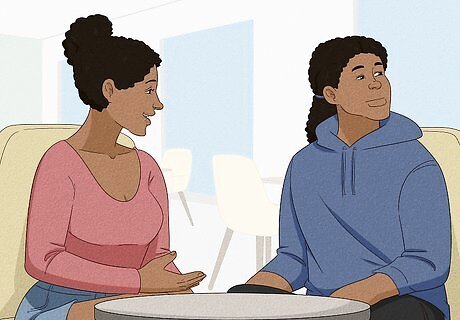
He makes little effort to communicate with you. Communication is one of the most important aspects of any relationship. If he doesn't seem interested in carrying on a conversation or if his responses have dwindled to a one-word retort or even a grunt, that could be an indication that he's no longer interested in the relationship. It could also mean that he has something huge on his mind that has nothing to do with you—but if that's the case, that's definitely something you want to know about as his partner. If this is your situation, you might say, "You seem really distracted or preoccupied lately. I've noticed you don't really communicate as much. Is there something going on that I can help you with?"

He isn't physically intimate with you like he was. Different couples do tend to settle into different rates of physical intimacy, but if yours has fallen off in the past few weeks or months, it could be a sign that he's done with the relationship. Physical intimacy is typically a big part of a close, loving relationship, and if he's not interested in that it could signal that he's on his way out. Mention the lack of physical intimacy in a non-threatening way and see what he says. For example, you might say, "I would really love it if we cuddled together for a few minutes before we go to sleep. Is that something you'd like to try?"

He doesn't laugh and have fun with you. Having fun together is one of the most important things if you want to continue to grow together as a couple. It helps you get closer rather than slipping further apart. If he's engaging in hostile humor, making fun of you, that can be one of the biggest signs that he's done with the relationship. He might sigh a lot or seem generally down when he's around you. If he's decided the relationship is basically over, he might view being with you as a burden rather than something that brings him joy.
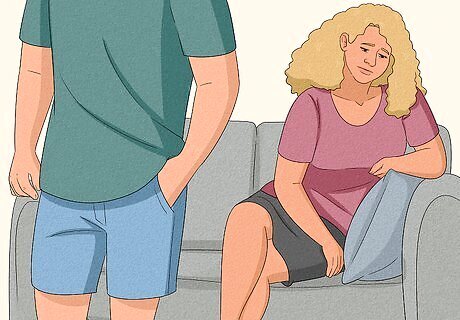
He avoids being with you or being around you. This sort of withdrawing is actually a defense mechanism so he won't be as hurt when you end the relationship. If he actively avoids being around you, it could mean that the relationship is over for him—but it could also mean that he believes you're the one who's feeling that way. For example, if you come into the living room and he's sitting on the couch, he might get up and go into the kitchen or the bedroom when you come in. If you live together, he might try to go to bed before you so he'll be asleep when you get to bed. Or, he'll stay up late until you've fallen asleep.

He doesn't deliver on things he tells you. He tells you that he'll go to the grocery store on his way home from work, then shows up empty-handed. Or he agrees to meet you someplace and then bails. Even if he simply forgot, this can be an indication that you're no longer a priority for him. When he's checked out of the relationship, he's not putting you (or the relationship) first, so it's going to be a lot easier for him to forget something he told you he'd do.
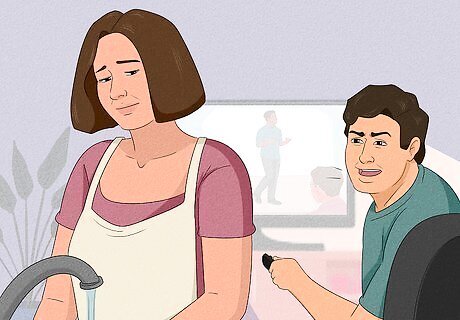
He is easily irritated by you. If he feels like the relationship is over, he's going to be in a pretty bad mood whenever you're around. All of those little things that he previously thought were so adorable have likely become irritants now. This is especially likely if he feels trapped with you or trapped in the relationship. For example, he used to think it was cute that you always had to do the dishes immediately after dinner—but now he gets annoyed that you're making noise in the kitchen while he's trying to watch TV.

He escalates little disagreements into huge fights. What ordinarily would've been a simple thing becomes a knock-down, drag-out fight. He might even bring up things that happened in the past that you thought were already resolved. Sometimes, when he does this, it's because he's hoping he'll get you angry enough to end the relationship. This could mean that he's just so irritated with you that things really do make him this angry—but it could also be a passive-aggressive way of trying to get you to end things because he doesn't want to end things himself.

He blames you for anything bad that happens. If your partner is quick to point the finger at you whenever anything goes wrong, he's likely no longer feeling emotionally connected with you. Even worse, though, this is a type of emotional abuse. If this is where you at, you probably need to think about getting out of the relationship before things get worse. For example, you go to a restaurant to eat and end up having to wait an hour for a table. He says that the wait wouldn't have been more than 15 minutes if you hadn't taken so long to get ready.
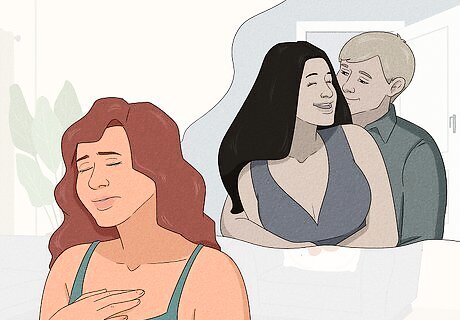
He has cheated on you before. Overwhelmingly, cheating happens because of a lack of emotional connection in the relationship. If that emotional connection wasn't repaired after the incident with cheating, he likely still doesn't have the emotional bond with you to make the relationship work. This isn't to say that he's necessarily going to cheat again, or that you should always end the relationship when your partner cheats. But your relationship needs counseling that addresses the lack of an emotional connection first. If your relationship still isn't meeting his needs emotionally, he may have decided that he's ready to move on—even if he's no longer actively cheating. Reader Poll: We asked 395 wikiHow readers, and 68% said that if they found out that their partner was cheating, they’d choose to end the relationship. [Take Poll] Whether or not that's the right decision for you is totally your call. But if you do decide that past infidelity is too much for you two to handle, you wouldn't be alone in feeling that way.

He's started hanging out with new friends. It's normal for couples to have a mix of individual friends and mutual friends. But if he suddenly starts hanging out with a new group of people and won't introduce you to them, that could be a sign that he's preparing to move on to the next chapter in his life. If he's feeling like the relationship is over, he's making new friends who don't know him as part of a couple. They only know him for him and when the two of you split he'll have people to hang out with.

He doesn't support you and has different goals in life. When couples don't grow together, that often means they grow apart. If he's started focusing on different hobbies and interests that don't involve you, that could be a sign that he's ready to move on. For example, you always used to play pickleball together, but recently he's gotten into cycling and joined a cycling team. He's out cycling during the times when the two of you would normally play pickleball.
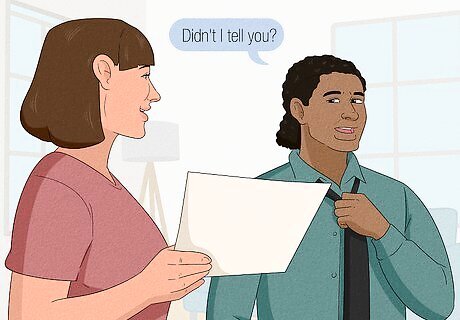
He forgets to tell you about good things that happen. When someone is your partner, they're usually the first person you want to tell when something good happens to you. If he doesn't do this, it's likely a sign that he's preparing to cut you out of his life. He also might not think that you would care or be interested. For example, he might say, "I can't go to the pool on Saturday, I have a work thing to go over my new responsibilities. Didn't I tell you? I got that promotion last week."
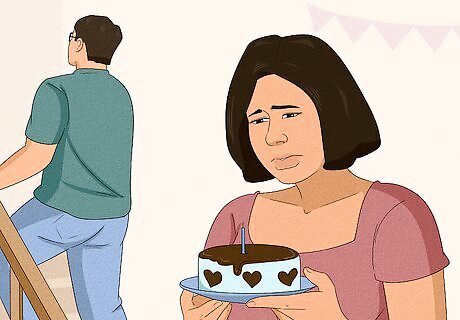
He no longer remembers significant dates or events. This is an aspect of "quiet dumping," a phrase that means he stays in the relationship by doing the least effort possible that will still avoid confrontation. He doesn't go to any effort to remember family birthdays or other milestones because these things are no longer important to him. At the same time, he still probably wants to avoid conflict, so if you mention it directly he'll apologize and seem sincere.

He lies to you or doesn't treat you with respect. If he's started lying to you and doesn't respect you, it might be time for you to end the relationship. You don't deserve to be with anyone who treats you like that. But it's also often a sign that he's done with the relationship anyway. If he loves you, he'll respect you—even if he has decided to move on. If you repeatedly catch him in lies or if he's dismissive of your concerns, it's better for you to get out of that relationship before it gets worse.
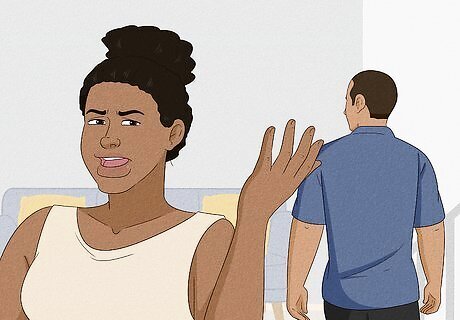
He no longer bothers arguing with you. If he's reached this point, he doesn't even have enough emotional energy to get angry or upset with you. He's gone past the point of contempt to the point where there's, unfortunately, nothing there. When he gets to this stage, he's not arguing with you because it's just not worth it to him. He likely doesn't see how anything's going to get resolved, so it's not even worth mentioning that something bothers him.

He doesn't talk about the future anymore. When he's committed to the relationship, he's going to include you in his future thoughts and plans. But if he's at the point where he feels the relationship is over, he's not going to include you in those thoughts at all. In his mind, you're not going to be there, so there's no point in discussing those things with you. This could mean that he's definitely decided he's done with the relationship or it could mean that he's just trying out the idea. He's trying to envision what life would be like without you.

He constantly talks about someone else. If there's someone else on his mind all the time, or if he constantly brings up this same friend, that could be a sign that he's fantasizing about having a relationship with that person—even if he's not actually cheating on you. It's called "emotional cheating," and it usually happens when he's depending on that other person to meet his emotional needs that aren't being met in your relationship. If you can get him to talk about the situation openly, you might be able to address his unmet emotional needs directly in a healthy way. Keep in mind that he might not even be aware that this is going on. Often, these emotional affairs are started subconsciously.
Taking Action

Have an open and honest conversation. Choose a time to sit down and talk without distractions. Use "I" statements, which will keep the conversation focused on how your partner's actions affect you. If you start sentences with "you," he's likely to get defensive. For example, you might say, "I feel upset when you leave me out of your future plans. It makes me think you don't see yourself with me in the future. Can we talk about it?" If he's been irritable and withdrawn lately, you might say, "I feel sad when you're so withdrawn. I worry that you might be going through something tough. Do you want to talk about it?"

Set boundaries with each other. Regardless of what you decide to do, the two of you need to be on the same page about your limits going forward. If both of you are honest with each other about your boundaries and then each of you respect each other's boundaries, you'll be making progress toward a healthy relationship. If you've never talked about these kinds of things before, it's not too late! Talking about your limits can help you understand why something that he never would've thought about might actually be really hurtful to you. Boundaries are about meeting each other's needs. As you talk, if you have a boundary that he's not willing or able to respect, that might be time to talk about ending the relationship.

Focus on self-care and healing. No matter what, taking care of yourself and your own well-being is the most important thing for you to do at this time. If you and your partner have decided to call it quits, this is your opportunity to reconnect with yourself as a whole person and rediscover the things that fulfill you. For example, you might start doing yoga or going for walks outside by yourself. Journaling is another good way to get in touch with yourself and your core feelings. It can help you figure out what you need the most right now. Think about hobbies or interests you had in the past that you might've dropped. Do any of them interest you again? You might pick them back up.
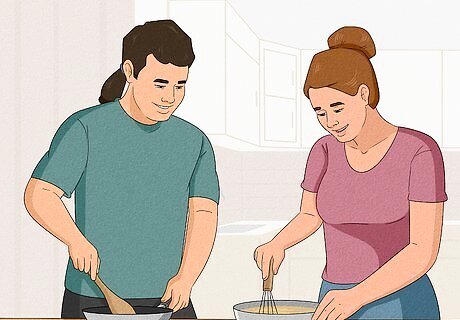
Reintroduce old relationship rituals to strengthen your bond. It's the little things in a relationship that help the two of you connect on a daily basis. Think back to all the little things you used to do together in the past and make an effort to bring some of those things back. You might find that you start feeling more like a couple again. Reintroduce old rituals gradually so that it doesn't feel forced and neither of you feels overwhelmed. For example, if you used to make breakfast together every morning and now you never do, you might start by making breakfast together 3 mornings a week.

Express gratitude toward each other for the things that you do. When you show gratitude to your partner, it tells him that you're not taking him for granted. Start by simply thanking him any time he does something that benefits you or both of you as a couple. Try to find at least one thing to thank him for every day. For example, you might say, "Thank you so much for taking out the trash this morning. I really appreciate it."

Talk to a couples counselor or therapist. If both of you care about your relationship and want to try to make it work, get help from a counselor or therapist. If the two of you still have strong feelings of love toward each other, a therapist can do a lot to help you understand the feelings behind how you act so those feelings can be addressed directly. For example, you might have a recurring argument about doing the dishes, but really what's going on is that you're exhausted, the pile of dishes in the sink is always the first thing you see when you come home, and you think your partner expects you to do them. When you can untangle the underlying meaning of some of these disagreements and deal with the feelings head-on, the two of you might be able to turn the corner.

Decide whether to end the relationship. Ultimately, you have to decide whether you want to remain in the relationship—and that's a decision for you alone to make. If your needs aren't being fulfilled by the relationship, it might be time for you to step away. If he's emotionally checked out of the relationship, he might not be able to meet your needs. In that case, you might be better off without him. Remember also that you can only try to preserve and heal a relationship if that's something you both want to do. It's going to take time and effort from both of you. Trying out things apart for a short period of time could also help. It at least gives you the opportunity to start living more independently and see what it's like not to have him in your life.

















Comments
0 comment